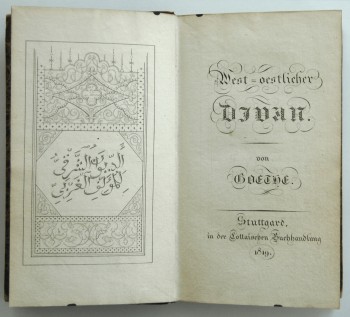Goethe's Arabic Title Page

West-östlicher Divan by Goethe (1st edition)
After I posted on Goethe & his Color Theory last week, Tom Cheetham mentioned the post on his Corbin blog, and pointed to his own postings on the matter, looking at Corbin’s interests in Goethe and at the latter’s interests in Islam and Islamic poetry, Hafiz peeminently (here). I have been reading Goethe’s West-Östlicher Divan for a long time now, & have given thought to the possibility of retranslating it into English, or at least about writing on the connections between Goethe’s and Hafiz’s work & the writing/translating involved. Tom’s piece sends you on to an essay by Jeffrey Einboden, The Genesis of Weltliteratur: Goethe’s West-östlicher Divan and Kerygmatic Pluralism (pdf file access), which blew me away. Something I didn’t know, couldn’t in fact have known, as the modern German edition I own and use does not reproduce the original title pages of the 1819 Stuttgart edition that give both a German and an Arabic title for the book — titles that are epistemologically different, even opposite, the one being a “conscious mistranslation of the other,” as Einboden writes:
Here the reader is confounded once again with a stark and monumental polarity. Although now rarely recognised, it is clear that this 1819 publication bears a double title, one in German and one in Arabic. The German title is well known to us—West-Östlicher Divan—i.e. ‘The West-Easterly Poetry Collection’. The other, facing, title in Arabic is not customarily cited, and reads: الديوان الشرقى المولف الغربى ‘The Eastern Poetry Collection of the Western Author’.
Surprisingly, the very title of Goethe’s work is a conscious mistranslation of itself, and consequently, at the very inception of the 1819 Divan, we are reminded that we are entering not one, but rather two works. One text bears an ‘Occidental’ title of synthesis, of amalgamation; the other text bears an ‘Oriental’ title of separation, of distinction. In the language of Europe, the poem is a mixture of East and West, but in the language of the Near East, the ‘Collection’ is itself wholly Eastern and the ‘Author’ is wholly Western: the الدوان (\ad-diwan\Poetry Collection) is الشرقى(\ash-sharqi\Eastern) and the للمرلف (\li’l-mu’allif\Author) is الغربى (\al-gharbi\Western). According to his Arabic title, Goethe’s work is not dialogical but monological, not synthetic but integral.
One could of course ask the question, which came first, the German or the Arabic title? Goethe is working with and from Hafiz’s poems — though most likely more with the new translation into German, than with the Arabic text itself, though who is to say? This fascinates me deeply, and I need to do research and writing in this area — time permitting. In past essays I have tried to track how (m)other languages haunt the literary text and inflect it, posing translation conundrums. Goethe’s inscription of a profound difference of view-point in the two languages of his title seems like fertile ground for meditating further on these matters.


 Poasis II: Selected Poems 2000-2024
Poasis II: Selected Poems 2000-2024 “Todesguge/Deathfugue”
“Todesguge/Deathfugue” “Interglacial Narrows (Poems 1915-2021)”
“Interglacial Narrows (Poems 1915-2021)” “Always the Many, Never the One: Conversations In-between, with Florent Toniello”
“Always the Many, Never the One: Conversations In-between, with Florent Toniello” “Conversations in the Pyrenees”
“Conversations in the Pyrenees” “A Voice Full of Cities: The Collected Essays of Robert Kelly.” Edited by Pierre Joris & Peter Cockelbergh
“A Voice Full of Cities: The Collected Essays of Robert Kelly.” Edited by Pierre Joris & Peter Cockelbergh “An American Suite” (Poems) —Inpatient Press
“An American Suite” (Poems) —Inpatient Press “Arabia (not so) Deserta” : Essays on Maghrebi & Mashreqi Writing & Culture
“Arabia (not so) Deserta” : Essays on Maghrebi & Mashreqi Writing & Culture “Barzakh” (Poems 2000-2012)
“Barzakh” (Poems 2000-2012) “Fox-trails, -tales & -trots”
“Fox-trails, -tales & -trots” “The Agony of I.B.” — A play. Editions PHI & TNL 2016
“The Agony of I.B.” — A play. Editions PHI & TNL 2016 “The Book of U / Le livre des cormorans”
“The Book of U / Le livre des cormorans” “Memory Rose Into Threshold Speech: The Collected Earlier Poetry of Paul Celan”
“Memory Rose Into Threshold Speech: The Collected Earlier Poetry of Paul Celan” “Paul Celan, Microliths They Are, Little Stones”
“Paul Celan, Microliths They Are, Little Stones” “Paul Celan: Breathturn into Timestead-The Collected Later Poetry.” Translated & with commentary by Pierre Joris. Farrar, Straus & Giroux
“Paul Celan: Breathturn into Timestead-The Collected Later Poetry.” Translated & with commentary by Pierre Joris. Farrar, Straus & Giroux